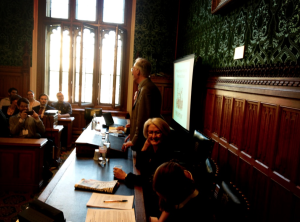Positive Money at The People’s Parliament

On Wednesday 25th of June, Ben Dyson was joined by Professor Tim Jackson, Ann Pettifor and Dr Anastasia Nesvetailova in the Houses of Parliament for a debate entitled Making Money Work for People and Planet.
The chair, Michael Meacher MP, opened the event declaring that he believed that the topic of the evening was one of the most important issues for society to consider today.
Professor Tim Jackson grounded the discussion by describing some very different financial institutions, from Amigo Loans, who offer quick money as long as a friend vouches for you, no credit checks needed just eye watering interest rates charged, to examples of small and medium scale investment schemes such as Shared Interest, “where justice is at the heart of trade finance.”
Professor Jackson finished his presentation insisting that the latter financial institution would remain embryonic if the ‘deeply inequitable’ money system was not challenged.
It is often said that money is power, Ben Dyson from Positive Money began, so those that have the power to create money need to be carefully scrutinised. We have put the power to create money into the hands of those that benefit from it: 97% of the money in our system is created by banks through credit creation, giving the banks the power to make money – as well as the incentive to create too much.
Ben outlined the reforms put forward by Positive Money, insisting on the need for a public, accountable and transparent committee to be responsible for money creation. Leaving money creation in the hands of the banks is simply signing ourselves up to more debt. In answer to those who call for reform, Ben argued that the banks are too powerful and too well resourced to be effectively constrained by regulation, they outgun the regulators and will always be able to find loopholes.

Ann Pettifor expressed her excitement that this debate was taking place, exploring the malaise at the heart of the current economic system. But Ann made it clear that, in her view, regulation was the solution, highlighting the ‘golden age of economics’ between 1945 and 1971 when, Ann said, there was not a single sovereign debt problem. During this time the banks were considered servants to the economy and not masters of the economy. If we are going to tackle the big issues in our society we need credit, Ann insisted, but with “capital controls… That is what we should be fighting for!”.
Dr Anastasia Nesvetailova problematized any assumption that the financial system is relatively uniform or straightforward in its core functions and actions. Instead, she highlighted those financial innovations associated with shadow banking, which has transformed our capitalism. “it is no longer a financial capitalism, it is debt capitalism and we are all part of it – fortunately or unfortunately”.
Dr Nesvetailova argues that shadow banking has made the notion of a bank de facto bigger than it is. Behind the façade of any bank there is a further complex network of entities that are instrumental to the banking system. Shadow banking obscures risk due to its fantastic complexity and, because it is ‘shadow’, it is mostly out there – unobserved and consequently un-regulated.
Dr Nesvetailova’s finished by making the point that it is the ability of these financial institutions to socialise risk and not profit that causes the real pain to society. Currently, we are not just reliant on banks, we are also reliant on shadow banks. It is the regulation of that universe which should be of the utmost concern to any politician.
The presentations led to lots of questions and a lively debate between the panellists.
Here you can listen to the recording:
And here’s the presentation of Prof Tim Jackson that was missing in the original recording:
The People’s Parliament is a discussion series held in Parliament, hosted by John McDonnell MP with the aim of livening up discussion and providing political depth to the debate in the run up to the next election. They have a packed schedule of events which you can book tickets to on their website.